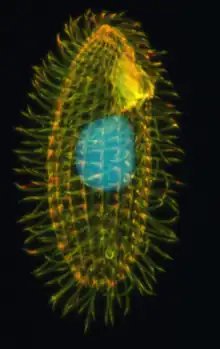Hymenostome
The hymenostomes are an order of ciliate protozoa. Most are free-living in freshwater, such as the commonly studied genus Tetrahymena, but some are parasitic on fish or aquatic invertebrates.[1] Among these is the important species Ichthyophthirius multifiliis, a common cause of death in aquaria and fish farms.
| Hymenostomes | |
|---|---|
 | |
| Tetrahymena thermophila | |
| Scientific classification | |
| Domain: | Eukaryota |
| Clade: | Diaphoretickes |
| Clade: | SAR |
| Clade: | Alveolata |
| Phylum: | Ciliophora |
| Class: | Oligohymenophorea |
| Subclass: | Hymenostomatia |
| Order: | Hymenostomatida Delage & Hérouard 1896 |
| Typical families | |
|
Suborder Tetrahymenina | |
The hymenostomes are fairly typical members of the Oligohymenophorea. Their body cilia are mostly uniform, sometimes with a few long caudal cilia, and arise from monokinetids or from dikinetids at the anterior. The oral cilia are in general distinctly tetrahymenal, with three membranelles and a paroral membrane, which corresponds only to the middle segment of the tripartite membranes found in certain scuticociliates. Mouth formation during cell division usually begins next to a postoral kinety.
The hymenostomes were first defined by Delage & Hérouard in 1896. Initially the scuticociliates and peniculids were included, then later treated as separate orders of a subclass Hymenostomatia, to which the astomes are sometimes added. More recently each of these groups tends to be treated as a separate subclass.[2]
References
- Golini, Victor I.; Corliss, John O. (January 1981). "A Note on the Occurrence of the Hymenostome Ciliate Tetrahymena in Chironomid Larvae (Diptera: Chironomidae) from the Laurentian Great Lakes". Transactions of the American Microscopical Society. 100 (1): 89. doi:10.2307/3225789. JSTOR 3225789.
- John O Corliss (2016-04-20). The Ciliated Protozoa: Characterization, Classification and Guide to the Literature. Pergamon. pp. 112–124. ISBN 9781483154176. Retrieved 17 January 2018.